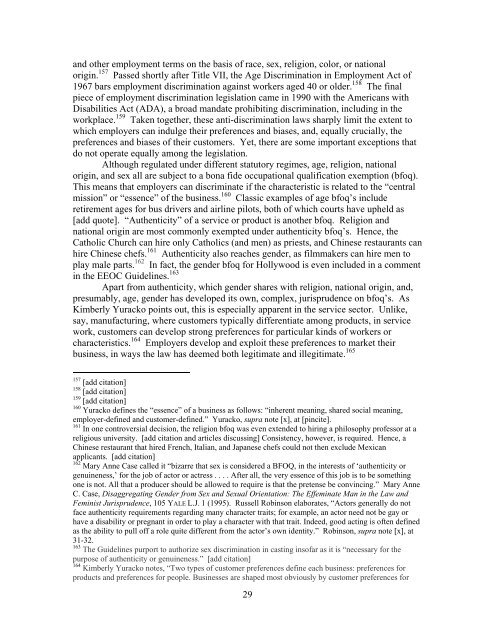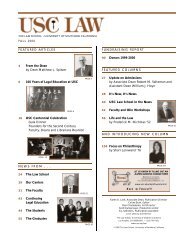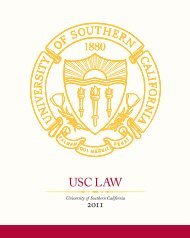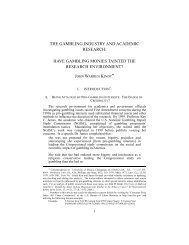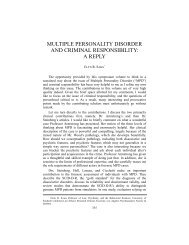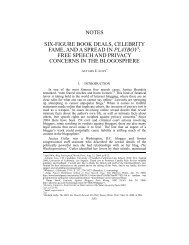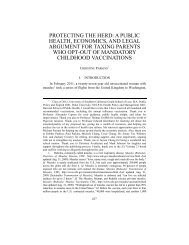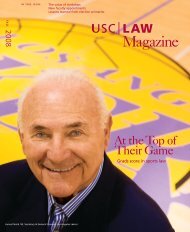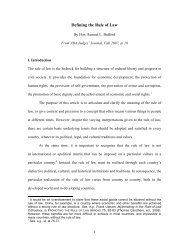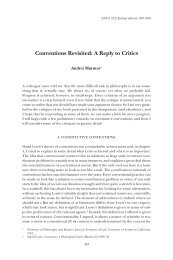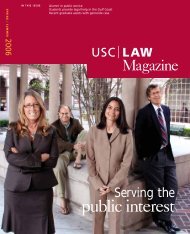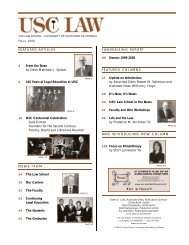1 Regulating Sex Work Adrienne D. Davis VERY ROUGH DRAFT ...
1 Regulating Sex Work Adrienne D. Davis VERY ROUGH DRAFT ...
1 Regulating Sex Work Adrienne D. Davis VERY ROUGH DRAFT ...
You also want an ePaper? Increase the reach of your titles
YUMPU automatically turns print PDFs into web optimized ePapers that Google loves.
and other employment terms on the basis of race, sex, religion, color, or national<br />
origin. 157 Passed shortly after Title VII, the Age Discrimination in Employment Act of<br />
1967 bars employment discrimination against workers aged 40 or older. 158 The final<br />
piece of employment discrimination legislation came in 1990 with the Americans with<br />
Disabilities Act (ADA), a broad mandate prohibiting discrimination, including in the<br />
workplace. 159 Taken together, these anti-discrimination laws sharply limit the extent to<br />
which employers can indulge their preferences and biases, and, equally crucially, the<br />
preferences and biases of their customers. Yet, there are some important exceptions that<br />
do not operate equally among the legislation.<br />
Although regulated under different statutory regimes, age, religion, national<br />
origin, and sex all are subject to a bona fide occupational qualification exemption (bfoq).<br />
This means that employers can discriminate if the characteristic is related to the “central<br />
mission” or “essence” of the business. 160 Classic examples of age bfoq’s include<br />
retirement ages for bus drivers and airline pilots, both of which courts have upheld as<br />
[add quote]. “Authenticity” of a service or product is another bfoq. Religion and<br />
national origin are most commonly exempted under authenticity bfoq’s. Hence, the<br />
Catholic Church can hire only Catholics (and men) as priests, and Chinese restaurants can<br />
hire Chinese chefs. 161 Authenticity also reaches gender, as filmmakers can hire men to<br />
play male parts. 162 In fact, the gender bfoq for Hollywood is even included in a comment<br />
in the EEOC Guidelines. 163<br />
Apart from authenticity, which gender shares with religion, national origin, and,<br />
presumably, age, gender has developed its own, complex, jurisprudence on bfoq’s. As<br />
Kimberly Yuracko points out, this is especially apparent in the service sector. Unlike,<br />
say, manufacturing, where customers typically differentiate among products, in service<br />
work, customers can develop strong preferences for particular kinds of workers or<br />
characteristics. 164 Employers develop and exploit these preferences to market their<br />
business, in ways the law has deemed both legitimate and illegitimate. 165<br />
157 [add citation]<br />
158 [add citation]<br />
159 [add citation]<br />
160 Yuracko defines the “essence” of a business as follows: “inherent meaning, shared social meaning,<br />
employer-defined and customer-defined.” Yuracko, supra note [x], at [pincite].<br />
161 In one controversial decision, the religion bfoq was even extended to hiring a philosophy professor at a<br />
religious university. [add citation and articles discussing] Consistency, however, is required. Hence, a<br />
Chinese restaurant that hired French, Italian, and Japanese chefs could not then exclude Mexican<br />
applicants. [add citation]<br />
162 Mary Anne Case called it “bizarre that sex is considered a BFOQ, in the interests of ‘authenticity or<br />
genuineness,’ for the job of actor or actress . . . . After all, the very essence of this job is to be something<br />
one is not. All that a producer should be allowed to require is that the pretense be convincing.” Mary Anne<br />
C. Case, Disaggregating Gender from <strong>Sex</strong> and <strong>Sex</strong>ual Orientation: The Effeminate Man in the Law and<br />
Feminist Jurisprudence, 105 YALE L.J. 1 (1995). Russell Robinson elaborates, “Actors generally do not<br />
face authenticity requirements regarding many character traits; for example, an actor need not be gay or<br />
have a disability or pregnant in order to play a character with that trait. Indeed, good acting is often defined<br />
as the ability to pull off a role quite different from the actor’s own identity.” Robinson, supra note [x], at<br />
31-32.<br />
163 The Guidelines purport to authorize sex discrimination in casting insofar as it is “necessary for the<br />
purpose of authenticity or genuineness.” [add citation]<br />
164 Kimberly Yuracko notes, “Two types of customer preferences define each business: preferences for<br />
products and preferences for people. Businesses are shaped most obviously by customer preferences for<br />
29


